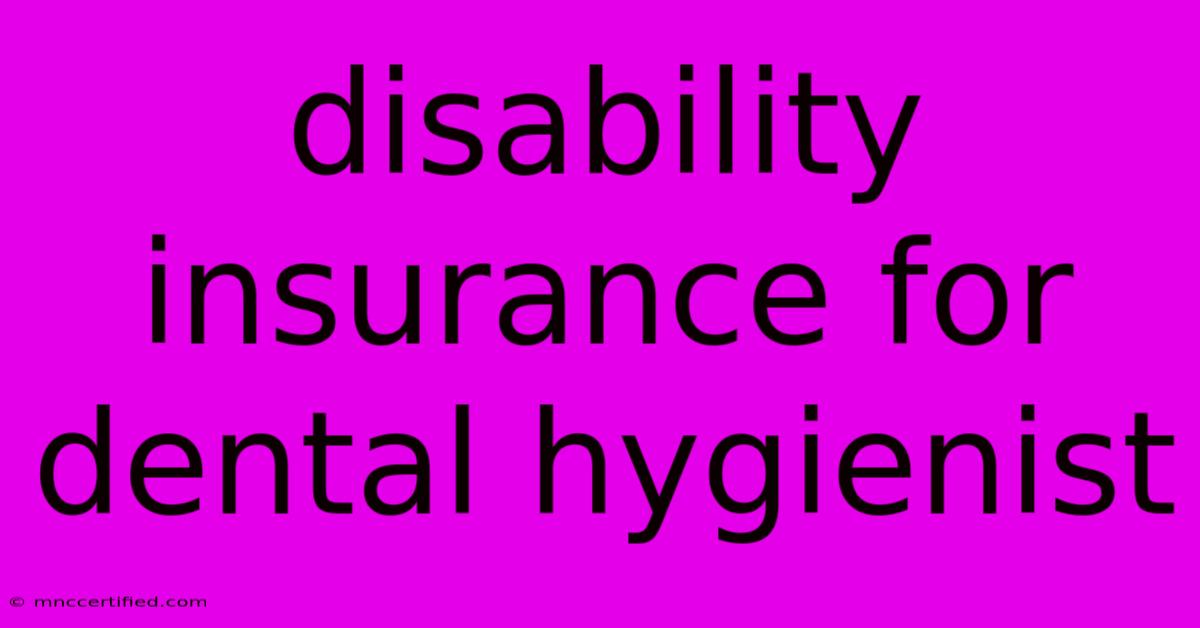Disability Insurance For Dental Hygienist

Table of Contents
Protecting Your Smile: Why Dental Hygienists Need Disability Insurance
As a dental hygienist, your hands are your livelihood. They're what allow you to provide exceptional care, build relationships with patients, and maintain a fulfilling career. But what happens if an injury or illness prevents you from working? Disability insurance can be your safety net, providing financial security when you need it most.
The Unique Risks Faced by Dental Hygienists
Dental hygienists face specific risks that make disability insurance a smart investment. Here's why:
- Repetitive Strain Injuries: The repetitive motions of scaling, polishing, and taking x-rays can lead to carpal tunnel syndrome, tendonitis, and other musculoskeletal disorders.
- Exposure to Hazardous Materials: Exposure to chemicals, radiation, and latex can increase the risk of allergies, skin conditions, and respiratory problems.
- Ergonomic Challenges: Working in awkward positions can strain your back and neck, leading to pain and limited mobility.
- High Demand for Specialization: Many hygienists specialize in areas like periodontics or implant care, requiring specialized training and experience. Replacing these skills can be difficult and expensive.
The Importance of Disability Insurance
Imagine this: You're diagnosed with a condition that prevents you from practicing for months. Without disability insurance:
- Your income stops.
- You face mounting medical bills.
- You struggle to cover your living expenses.
With disability insurance:
- You receive a portion of your income.
- You have the financial stability to focus on your recovery.
- You can return to work when you're ready, without financial stress.
Types of Disability Insurance for Dental Hygienists
There are two main types of disability insurance that dental hygienists should consider:
- Short-Term Disability Insurance: Covers income loss for a limited period, typically 3-6 months. This can bridge the gap while you recover from a short-term illness or injury.
- Long-Term Disability Insurance: Provides income replacement for a longer period, potentially up to retirement age. This is crucial for protecting your financial future in case of a serious illness or injury that prevents you from returning to work.
Key Features to Consider
When shopping for disability insurance, pay attention to:
- Benefit Period: How long will you receive benefits?
- Elimination Period: How long do you need to be disabled before benefits start?
- Benefit Amount: What percentage of your income will be covered?
- Occupation: Some policies offer different benefits based on your occupation (e.g., sedentary vs. manual labor).
Finding the Right Policy
- Talk to your employer: Some employers offer group disability insurance plans.
- Consult with an insurance broker: They can help you compare different policies and find the best fit for your needs and budget.
- Get quotes from multiple insurers: Don't settle for the first policy you find – compare prices and features.
Protecting your career and financial stability is crucial. Disability insurance can provide the peace of mind you need to focus on your health and well-being, knowing your finances are secure.

Thank you for visiting our website wich cover about Disability Insurance For Dental Hygienist. We hope the information provided has been useful to you. Feel free to contact us if you have any questions or need further assistance. See you next time and dont miss to bookmark.
Featured Posts
-
West Indies Clinch Series Win Over England
Nov 07, 2024
-
Aston Villa Ucl Run Ends Brugge Victory
Nov 07, 2024
-
West Indies Vs England Live Score Englands 47th Over
Nov 07, 2024
-
Ukraine Appeals To Trump Amid Uncertain Fate
Nov 07, 2024
-
Trumps Party Wins Senate What Now
Nov 07, 2024